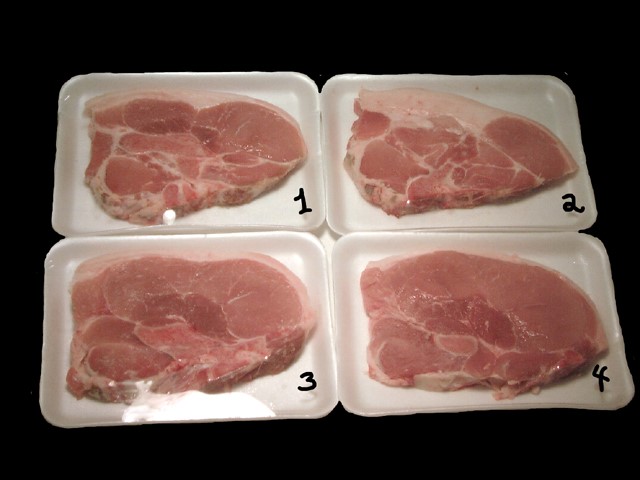
by Niki Crawson | Jan 3, 2020
Judging teams are a part of the 4-H curriculum that helps to build life skills. Arising as part of the early 4-H club work, judging teams were noted to have begun prior to 1921. In fact, 4-H Clubs were originally called corn clubs, because youth were taught how to grow a better crop of corn and in turn, would bring their corn into town to be judged.
4-H judging teams are short-term, intensive trainings in a particular subject area. The goal of the trainings is to compete at judging team competitions. Judging teams are typically comprised of three or four youth in the same age division, from the same county.
According to the Florida 4-H website (http://florida4h.org/programsandevents_/), the following are sanctioned state-wide judging teams:
- 4-H Consumer Choices/LifeSmarts
- Insectathon
- Dairy Judging
- Dairy Quiz Bowl
- Dairy Goat Judging
- Dog Quiz Bowl
- Forest Ecology
- Hippology
- Horse Quiz Bowl
- Horse Judging
- Horticulture ID and Judging
- Livestock Judging
- Land Judging
- Meat Judging
- Poultry Judging
For our panhandle 4-H members, the North Florida Fair has the following contests:
- Consumer Choices
- Agriculture Judging
- Horticulture Judging
- STEM Challenge
- Wildlife Ecology
Each judging contest has its specific rules and activities; however, the basic components of a judging contest include identification, judging classes, and oral reasons. A good judging team member has the following characteristics:
- A clear idea or mental picture of an items characteristics
- Quick and accurate observation skills
- The ability to weigh objectively and evaluate what is seen
- The ability to defend choices made
Now we want you to try your hand at judging. We will use the meat judging contest as an example. The following is a class of pork sirloin chops. A high quality sirloin chop has lots of meat, little fat, and little bone. A poor quality sirloin chip has little meat, lots of fat, and lots of bone. The sirloin chops are labeled 1, 2, 3, 4. Your job as a meat judge is to rank them in order of best to worst.
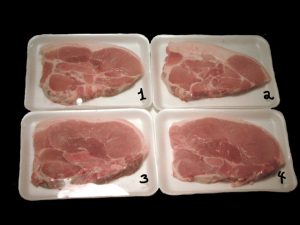
Your job as a meat judge is to rank meat in order of best to worst.
This class of pork sirloin chops are ranked 4-3-1-2, with cuts of 3-4-4. Four was placed first because it had the best combination of meat and little fat/bone. Three was placed second because it most resembled number four and had more edible meat than number one. Number one was placed in third because it had less fat and more meat than number two. Number two was placed last because it was the fattest sirloin chop with the least amount of meat.
Each judging class is worth 50 points. If you ranked this class 4-3-1-2, then you received 50 points. If you placed it another way, then you dropped points based on cuts. To learn more about how cuts work, please visit https://texas4-h.tamu.edu/wp-content/uploads/2015/09/photo_judging_contest_reasons2.pdf.
A 4-H meat judging team member would mark their 4-H judging card as seen below.
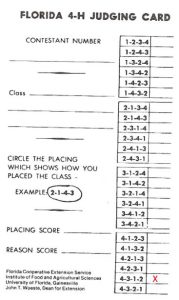
An example of a 4-H meat judging score card.
4-H judging teams provide a safe, positive environment for individuals to learn and develop life skills. Judging teams emphasize experiential activities, organization, allowing youth to take part in leadership activities, and providing opportunities for volunteers to act as mentors to youths.
Benefits of 4-H Judging Teams
- Build self-confidence and problem solving skills
- Communication and public speaking opportunities
- Meet new friends
- Travel the state and country
- Receive a scholarship for college
- Learn observational and critical thinking skills
- Find a new career
- Selecting an animal for a 4-H project
Participating on 4-H judging teams offer many benefits to participants. Team members are exposed to team work, effective communication skills and analytical thinking. Team members also build self-confidence as they become comfortable with all components of judging and evaluation. Development of these skills benefits every area of the 4-H judging team member’s life. An additional benefit from participating on a judging team is having the opportunity to travel to new places and meet and interact with industry leaders. Many times these relationships will aid 4-H members in the future as they choose career paths in any industry.
Many of our 4-H judging contests have national contests associated with them. If you are willing to put in the time and effort to develop skills in one of our contests, then you have the opportunity to travel across the country with 4-H and interact with industry leaders. Locally, several 4-H judging teams from the panhandle have recently participated in national 4-H contests. Members from Jackson County 4-H have been to the national poultry judging contest and national livestock skill-a-thon contest in Louisville in 2019 and the Escambia County 4-H meat judging team will be competing in Colorado in January 2020.
For more information on 4-H judging teams, please visit florida4h.org. Good luck and happy judging!
Special thanks to Brian Estevez, UF/IFAS Escambia County 4-H Agent, for providing this article and pictures.
by Niki Crawson | Dec 23, 2019
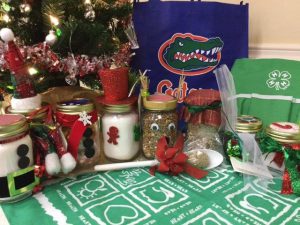
A variety of yummy treats in jars to give as gifts for the holidays.
One of my fondest memories around the holidays was making special presents with my mom. Often we would make cookies, to share with our neighbors and then give them a jar with the dough mixture and special instructions for making more. In fact, I’m sharing some of the recipes from my colleagues in Kentucky, North Dakota and Iowa Extension. We used recipes similar to these when I was little. I remember making spoons with dip seasonings on a wooden spoon with a cute bow and holly. We also used jars to put together a cookie or soup recipe. We would usually present the individual with a taste treat and a little note how to prepare the next batch with their jar.
RECIPE RESOURCES:
The great thing is you can do this with your children, teach them fractions and help with measuring skills, in the name of FUN! You can also help them enhance their creative skills. Decorations can be simple or elaborate depending on the amount of time you have. You are teaching them to productively use their time and sharing the great feeling of giving to others. Plus, you can include a science lesson on being a good conservationist by recycling and how you are being good to the environment. In fact, the conservation principles: reduce, reuse and recycle, can be applied to the entire gift giving process. Reducing will have the greatest impact on our environment because you are actually eliminating the purchase and use of another product. The way to do this with gifts in a jar is by reusing jars from pickles, mayonnaise and other food items. Just clean them thoroughly.
If you have limited dollars to use for gift giving, this can be a very economical option. Especially making the cute spoons for dips that the receiver would just add sour cream or mayonnaise to complete the dip. Remember when giving the gifts, take into consideration any food allergies. If you do not have the means to do gifts from the jar, perhaps a gift of your time or talent would be more appropriate than an actual product, like a coupon for mowing the lawn, raking leaves, babysitting, etc. Another option would be to share some of your favorite recipes cards, so your friends can also enjoy your favorite dishes. Other ways you can save is by reusing and recycling gift bags, tissue paper, ribbons and other packaging material.
So gifts in a jar can be a great way to have a few extra gifts under the tree for those individuals who love your cookies, candy, soup etc. It is also great for those individuals you didn’t plan for but want to give them a little something.
Special thanks to Paula Davis, UF/IFAS Bay County 4-H Agent, for providing this article and picture.
by Niki Crawson | Dec 6, 2019
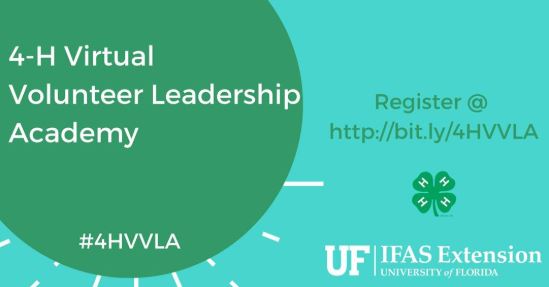
Each third Thursday of the month starting in January 2020, we will be offering the 4-H Virtual Volunteer Leadership Academy at 11:30 AM Central. Join us as we share a different topic each month that will give our volunteers more knowledge and tools that will help positively impact the youth in our communities as well as the opportunity to network with other volunteers in the 4-H community! As an added bonus, volunteers will also have the opportunity to earn a digital badge to display on their social media.
Registration Information
Registration is required and can be found at http://bit.ly/4HVVLA Once registered, you can join each session live through Zoom. In addition, if you are unable to connect live, all monthly webinars will be available to you on demand as they are recorded. Register early – seats are limited to the first 100 registrants. As a registered participant, you will have access to all of the sessions available. You will also be able to view them as often as you like. Missed a session? No problem! You will receive a courtesy email letting you know how to access the missed session on demand.
4-H Virtual Volunteer Leadership Academy
- January- Preparing for County Events Showcase
- February- Professional Portfolio Tips
- March- Projects & Record-keeping
- April- Awards & Recognition
- September*- Judging Contests
- October*- Preparing for Exhibits & Shows
*Fall session registration will be available July 1, 2020.
Webinar Viewing Information
Join each live session simply with one click from your phone, tablet or computer, using the Zoom app. Once you have registered, you will receive email communication regarding the Zoom session links, dates and times.
So, go ahead, register now! Secure your seat for the 4-H Virtual Volunteer Leadership Academy! Not a current 4-H volunteer? Not a problem! Join the 4-H family today – the process to become a volunteer is relatively simple: visit http://florida4h.org to apply online or stop in to your local UF IFAS County Extension Office and meet your 4-H Extension Agent for assistance. #4HVVLA
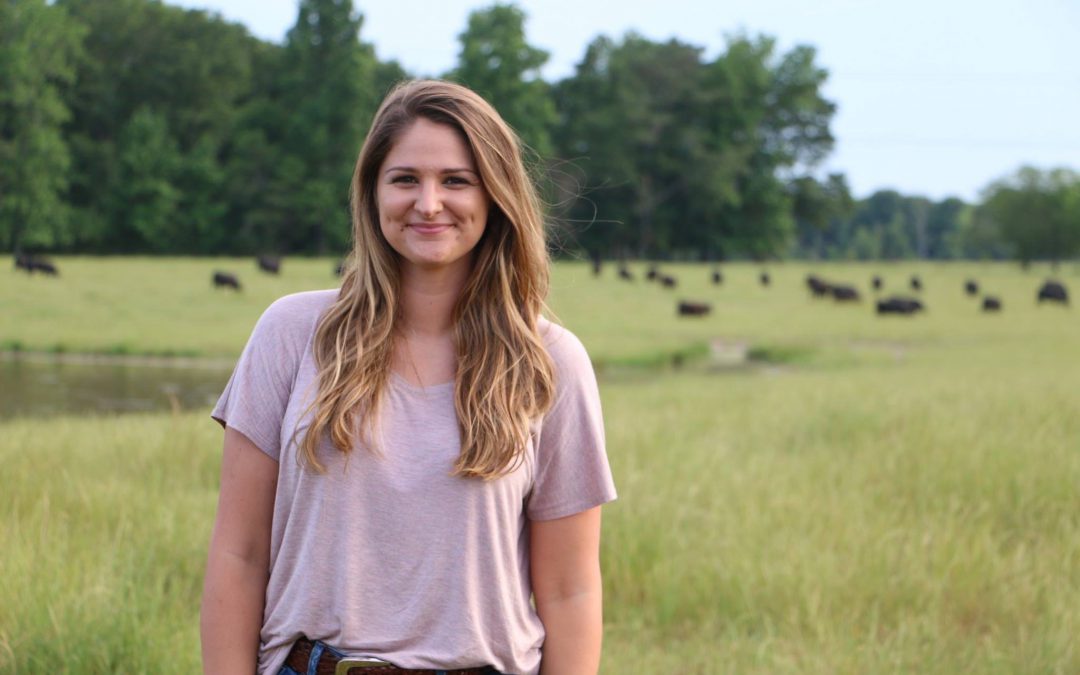
by Niki Crawson | Nov 29, 2019
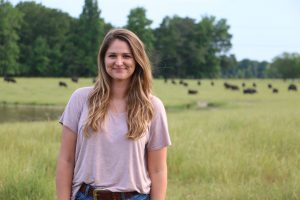
Caroline Chappell, Jackson County 4-H Extension Youth Development Agent
Please help us welcome Caroline Chappell to our Northwest District 4-H Family!
Caroline is our newest 4-H Youth Development Extension Agent in the Florida Panhandle, filling the 4-H Agent position in Jackson County. Caroline is no stranger to our area as her hometown is Graceville, Florida where she grew up on her family’s beef cattle farm with her siblings. As a youth, she showed her family’s Angus cattle all over the country, was a member of the University of Florida Livestock Judging Team as well as a member of the Meat Animal Evaluation Team.
With a passion in livestock, Caroline earned her Bachelor’s Degree in Animal Sciences from the University of Florida and her Master’s Degree in Animal Sciences with a specialty in Beef-Forage, from Auburn University. Although she has a strong livestock background, Caroline states that she is “excited to start all kinds of different programming for Jackson County 4-H!”
Caroline is a recent newlywed, who married Logan Chappell, an employee for Farm Credit of NW FL in Marianna. They have a Corgi puppy named Tilly, who is just a year old. When Caroline is not working or spending time with her husband and puppy, she enjoys gardening, working with her family’s beef cattle operation, or watching her favorite movie, Big Fish.
Caroline admits that she was never in 4-H as a kid, but did assist with 4-H programming as an intern in Washington County and as a graduate student at Auburn University. She has assisted mainly with livestock/meats related programming. Caroline did report that one of her favorite 4-H experiences as an intern was when she helped put on a grilling workshop for the 4-H members in Washington County in preparation for the district tailgating contest a few summers ago. She said she had a lot of fun learning to grill and then helping others.
I found out a few inspiring facts about Caroline to share with everyone as well…Her inspiring role model in life is her dad. She said he loves Jackson County and over the last 25 years he has worked really hard (and still does) to make the community a better place to live. He’s impacted the lives of a lot of people through both his public service and in his career. She hopes that she can do the same in her new role as the Jackson County 4-H Extension Agent.
Another interesting fact Caroline shared is her favorite inspirational quote – “People don’t care how much you know until they know how much you care” by Theodore Roosevelt. And last, but not least, when asked if she could have one superpower, what would it be and why, she responded with, “the power to stop time. There’s so much to do, but it seems like never enough time to do it.” Ah, spoken like a true 4-H Extension Agent!
Welcome to our 4-H family, Caroline!
To meet your local 4-H Extension Agent, to find out more information about 4-H programs that can offer essential life skills such as independence, organizational skills, and goal setting, to your children or to volunteer with 4-H, please contact your local UF/ IFAS County Extension Office, or follow us on Facebook.
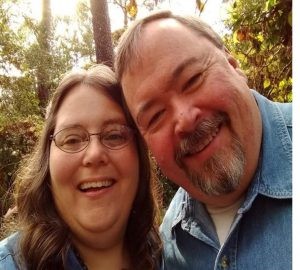
by Niki Crawson | Nov 1, 2019
November is National Inspirational Role Models Month
Before the medals and the ribbons and the physical manifestations of success, there is a club, a meeting, and adult, a friend that changes the life of a youth. Someone that gives youth the confidence to believe in themselves. Someone that they can look to as an example to follow. The Oxford dictionary defines a role model as “a person looked to by others as an example to be imitated.” In the midst of the social media culture where people have the potential to drastically influence a person’s life without ever holding a conversation, it is essential that youth have positive role models who will guide them in an ever changing society.
Organizations like 4-H, where programming is highly reliant on the dedication of volunteers, there are innumerable individuals who function as role models. Though there are many individuals, I have often found that most great role models function in similar manners and styles. Each style is as unique as each person, more important is the fact that each individual has an impact on the youth around them, consciously or not. Some individuals strive to have a significant impact on youth such as Angela Tinker. As the leader of the county wide Leadership Club, Angela Tinker is a positive role model and a consistent presence in the lives of the youth she works with. She is a shining example of just one of the many 4-H volunteers who serve to inspire youth as positive role models.
The Shepherd: Angela Tinker
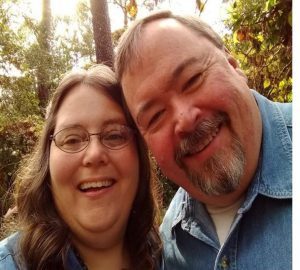
Pictured is Angela Tinker with her husband, Bill Tinker. Angela has served as an Escambia County 4-H Volunteer since 2008.
The role of the shepherd is to look after the safety and welfare of their flock. As youth grow older and near the completion of their 4-H careers, youth not only want to demonstrate their independence, but they need a safe environment in which to do it. They also need individuals who will lead them, and more importantly who will lead them by example.
Angela Tinker exemplifies a shepherd. She has worked as an Escambia County 4-H volunteer for eleven years. Over the course of her tenure, she has worked with younger youth as well as teenagers. She continues to lead the Leadership Club where she works with teenagers. When asked why she continues to serve as a volunteer, even though both of her daughters have graduated and moved on from the program, Angela responded, “seeing the little successes, which turn into big successes.” It is her passion to cultivate an environment in which the little successes of everyday emerge as life altering successes that enables her to be the role model these youth see when working with her.
Our Future
Angela is a role model that leads by quietly tending to the youth she works with, and by ensuring that they have the best opportunities to grow and build their skills. As budding adults, the youth Angela works with are in some of the most formative years of their lives. Everything and everyone that these youth encounter shapes them in one way or another. It is the positive role models in the 4-H organization like Angela who ensure that our youth have the best chance to develop into the best person possible. Angela is an example of the 4-H way of “Making the Best, Better” every day.
Who Do You Inspire? Become a Role Model – Become a 4-H Volunteer
If you have knowledge or skills that you can share with youth in your community, consider becoming a 4-H volunteer! 4-H is always in need of caring, positive adult role models to serve in the role of 4-H volunteers. From leading a club to judging public speaking or teaching a craft project, contact your local UF/IFAS County Extension Office or visit our website to learn how you can serve as a positive adult role model today to make a difference in the lives of our youth tomorrow.
Special thanks to Aly Schortinghouse, UF/IFAS Escambia County 4-H Agent, for providing this article and picture.









